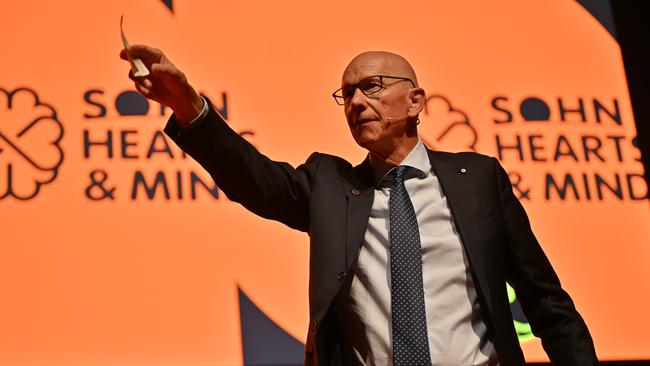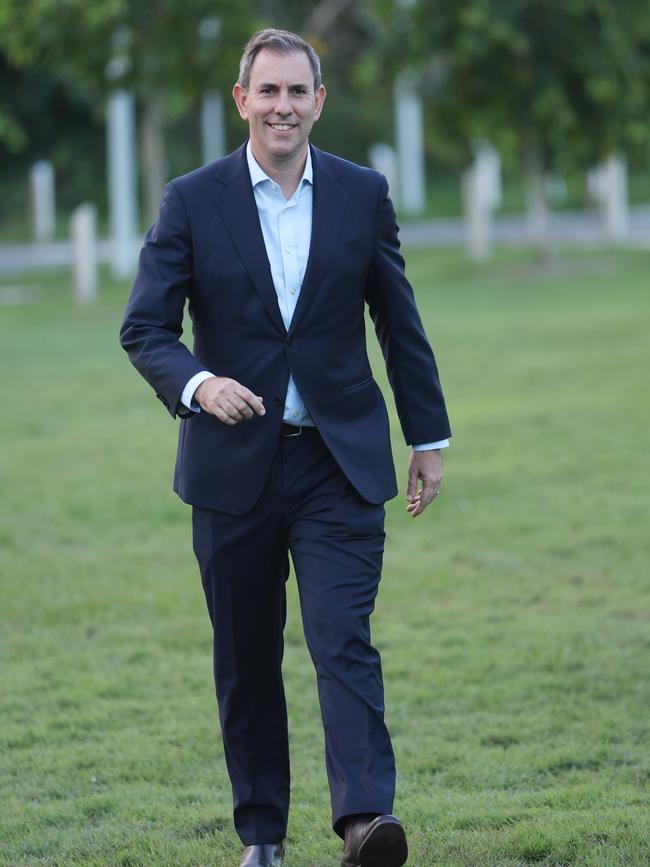Super tax battle must start before it drives the rich offshore and triggers another house price surge
Activist fund manager Geoff Wilson says federal Labor’s planned super tax will have enormous unintended consequences and he believes there is a better way forward.

For investors it is now almost certain the first big battle in the new parliament will be over tax – specifically the extraordinary plan to tax unrealised gains in super.
“People are only beginning to realise what’s going on here,” says fund manager Geoff Wilson.
Wilson, who runs Wilson Asset Management, led the investor campaign against attempts to cut the benefits of franked dividends in 2016. Now he has a new battle on his hands.
And the first thing he needs to get across to the wider world is that this tax controversy is not so much about a plan to tax people with more than $3m in super as it’s that an ALP government plans to tax “paper gains” in super.
Crucially, because there is no arrangement to index the new tax to inflation, it is going to affect a rapidly widening segment of the population in years to come.
As Wilson says on the latest Money Puzzle podcast: “I don’t think anyone is so much concerned that they have increased the tax rate.
“But one of the big concerns is for younger people who have worked hard and put their money into super; as inflation rises, this tax is going to trap more people every year.”
As Wilson points out, this version of bracket creep inside super means the effective 30 per cent tax rate on high value super will steadily engulf many more people in the years ahead. Wilson says that among Self Managed Super Funds – one in three will be inside the 30 per cent tax net by 2039.
But the absolute sting in the tail is that the tax is based on paper gains. For example, if you bought shares in a profitless start-up, and the value of those shares went from $100,000 to being worth $4m over a number of years, you would have to pay tax on the gain in the notional value of those shares at the end of each year.

If, six months later, the value of that same investment plunges back to $100,000, you have paid a hefty tax bill even though you never got to cash in.
(Technically, the new tax is 15 per cent on earnings on amounts above $3m. There is already a 15 per cent tax on super on amounts over $1.9m so that’s how the new tax would create an effective 30 per cent super tax rate).
Wealth managers across the sector say the new tax will unfairly fall on unsuspecting owners of small business, or start-up investors, or even farmers. Wilson says there are at least 3500 farmers who have put their farms into their super funds.
Yet federal Treasurer Jim Chalmers has made it clear he plans to reintroduce the stalled bill, called Division 296, into the next parliament.
A crisis ready to unfold
Wilson has gone as far as getting the research wing of his $6bn fund management group to produce a discussion paper on the tax, and the conclusions are dramatic.
In short, the report says:
● Among the wealthiest Australians there will be moves to shift money out of super, including a move to take money offshore.
The paper looks at the parallel case of Norway where the government doubled the tax on unrealised gains. The tax change triggered the exit of 100 of Norway’s top 400 individual taxpayers from the country.
“The Norwegian brain and wealth drain is a direct result of the tax on unrealised gains … Throughout history, changes in regulations, taxation or currency controls have led to capital outflows because it leads to uncertainty,” the paper says;

● The tax will never raise anything like the $2.3bn per annum which is pencilled into the budget long term because investors will rapidly change their behaviour to make sure they are never caught inside the tax;
● The new tax will choke off start-up money which has been flowing from self-managed super funds to new business ventures;
● Money flowing out of super will go back into residential property where the capital gains tax exemption will stay in place. As the paper says, “the end result will be to further lock out the younger generation for buying into the housing market”.
The mechanics of the tax are complex even by the standards of our notoriously complex super tax system. Gains would be taxed but losses would not be compensated. Instead, they could only be set against future profits in a manner similar to capital gains tax.
In other words it sounds like a dog’s breakfast. But the issue for Wilson – and everyone else who is against the design of the new tax – is that the government has so far offered no alternative.
Wilson’s preference is to see the tax shelved in the next parliament in favour of a full review of super taxes. If it is to go ahead, it should be based on actual gains, which is how the tax system works for almost everything else.
But the political reality of this option would be the tax collection from actual gains might only be a fraction of unrealised gains.
Wilson’s argument is that the government is never going to achieve its revenue target anyway because investors change their behaviour ahead of a change in tax rules.
The other outstanding alternative mechanism being discussed is to apply the new tax based on a “deeming rate” – the deeming rate whereby the government assumes a set rate of return for all investors each year is already established inside the pension system.
Wilson echoes industry leaders across the investment market: “Look, I’m open … anything would be better that what’s on the table.”
James Kirby hosts the twice-weekly Money Puzzle podcast.






To join the conversation, please log in. Don't have an account? Register
Join the conversation, you are commenting as Logout